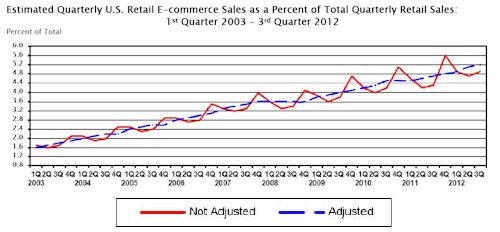Clicks vs. Bricks
With the huge popularity of the internet it’s no longer uncommon for people to do their discretionary shopping online. The trend is towards more and more online purchases. According to the U.S. Census Bureau News, eCommerce for the 3rd Quarter of 2012 was 5.2% of total retail sales while it was only 1.7% of total sales in 2003 and 3.6% in 2008. In addition, eCommerce was up 17.3% over year earlier levels while regular retail sales was only up by 4.6%. So it appears that although eCommerce is still only a small percent of total retail sales it is gaining ground rapidly.
So what are the advantages and disadvantages to each style of buying?
Buying in Person – the Pros
There are a few key advantages to buying in the flesh that will tend to slow the trend toward buying online. For starters you get to physically examine the product, try it on, you can inspect it’s aesthetics and quality, operation and performance first hand. You also have the benefit of being able to ask a salesperson any and all questions you might have about a product before you decide to purchase. The other decisive advantage here is the possibility of haggling – this is a lost art form to many but if properly executed you can make considerable savings, particularly on larger purchases where you are parting with a lot of cash. This leads us to the last advantage discussed here – dealing in cash. You do not have to worry about your credit card details circulating around the web to potentially be abused if you’re dealing in real life cash.
See:
- 10 Ways To Ensure Online Credit Card Security
- Dollars and Cyber-Sense: Tools to Help You Track Your Personal Finances Online
Buying in person – the cons.
On the other hand if you hate pushy salespeople you might prefer to buy online. When a person travels somewhere to physically look at a specific product they will innately want to leave with the product in their possession regardless of the price tag, some psychology about not wasting the journey could be to blame. This can be to the customer’s detriment as they are more likely to be influenced or pressured by the salesman who will be trying his best to push you into buying the product you have come to see.
Shopping around for a better offer takes up the rest of your day, and many will pay for the convenience of receiving the product there and then. If you’re buying a hefty product like a television for example it can also be a struggle to successfully transport the product back to your house.
Buying online – the pros.
The major advantage is how easy it is to shop around for the best bargain online. Your options are clearly presented to you and you can checks hundreds of prices for a product in a matter of minutes. You will often also have the advantage of being provided with many customer reviews from people who have bought the product before you, this gives you an honest and unbiased summary of the product’s quality before you purchase. Buying online also removes the headache of transporting your product to your house as the website you buy from will provide you with a range of convenient home delivery options.
Buying online – the cons.
As discussed earlier, you are potentially at risk when you submit your credit card details on the internet, however there are security measures you can take to reduce your vulnerability such as frequent password changes on your accounts and difficult to answer ‘secret questions’. Buying online also lacks the provision of getting to ask specific questions about the product to salesman, though if you’re prepared to do the extra leg work you may get the answer you’re seeking using a search engine.
See Also:
- Online Banking
- Personal finances online
- 10 Ways To Ensure Online Credit Card Security
- Choosing an Online College
- Online Life Insurance Quote
Recommended by Amazon:
- E-commerce Get It Right! Essential Step-by-Step Guide for Selling & Marketing Products Online.
- Internet Prophets: The World’s Leading Experts Reveal How to Profit Online
- E-Commerce Blueprint: The Step-by-Step Guide to Online Store Success
- E-commerce 2013
This article has been provided by Todd McCullough – an independent blogger and finance researcher.

